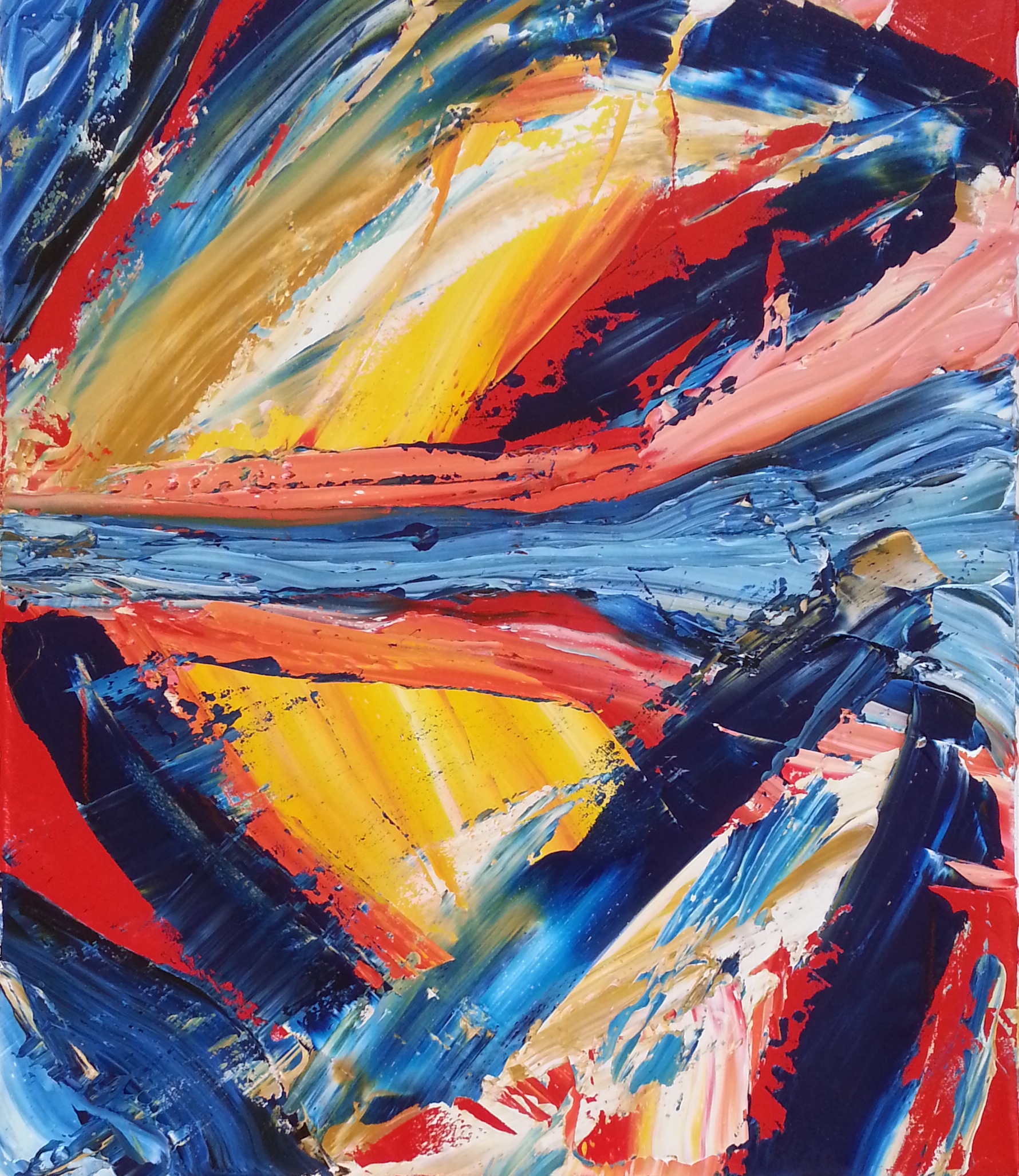
Oils on 40 x 50 cm stretched canvas.
Research Methods, Ethics, Revolution
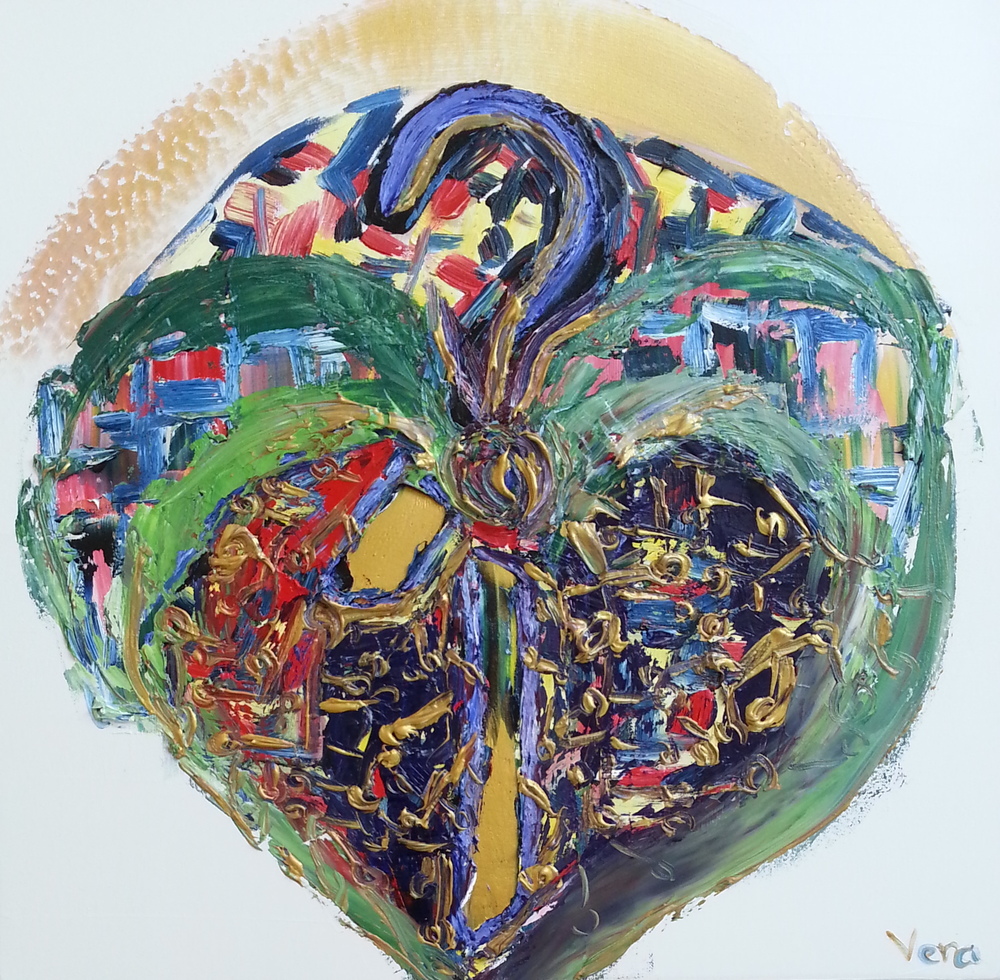
TODAY!
is the deadline to play my art raffle game.
Also the day a two-day hearing starts in the UK in which a student fights US extradition.
WHAT?
The game: give one euro, get one chance to win a painting.
The student: electrical engineering student, Finnish conscientious objector, UK hacker, musician, privacy and surveillance expert, computer scientist, Occupy activist, certified Aspergiac, and alleged Anonymous participant in peaceful political protest that large numbers of people participated in as part of #OpLastResort, Lauri Love.
HOW?
Donate to Lauri Love’s Courage Foundation legal defense fund in support of his fight against US extradition. Just give to Courage directly and email me the receipt.
WHY?
Play my art raffle game now, or else I will keep painting over this layer of a reprise of a painting of a few variations on a general theme or two until I like it or throw it away.
Also because shit is so fucked up that people like Lauri and Aaron even have to fight these battles. They tend to have to do it with very poor institutional and social support. They cannot and should not have to do it alone.
Thanks to everyone who supports Lauri, Courage, and the freedoms of speech, association, information, thought, and active conscience for which they stand.
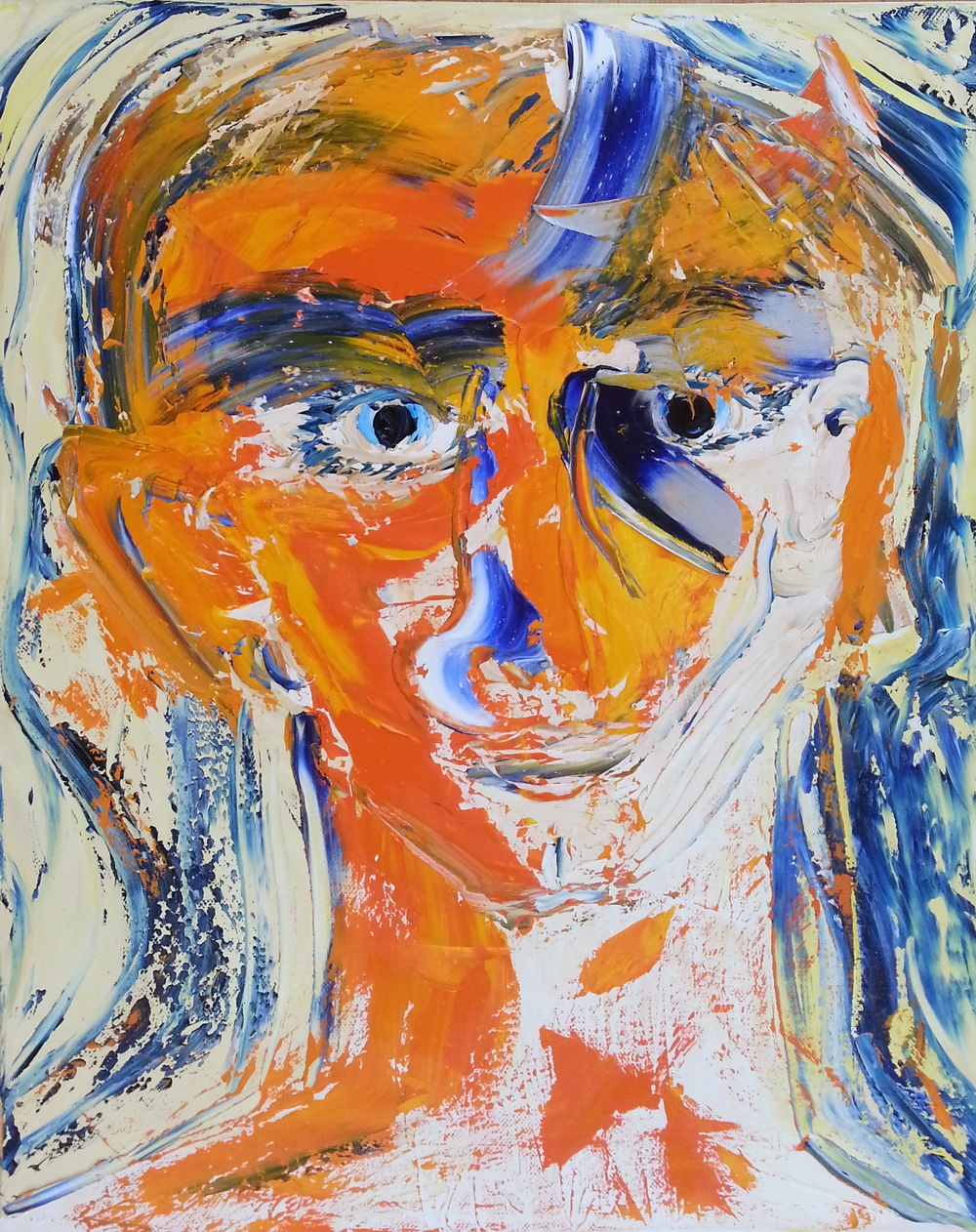
Portrait of truthteller Chelsea Manning. There’s also this song I wrote about her, one of the first in the “new Berlin oeuvre I can’t sing in front of other people” collection. Support Chelsea through the Courage Foundation.
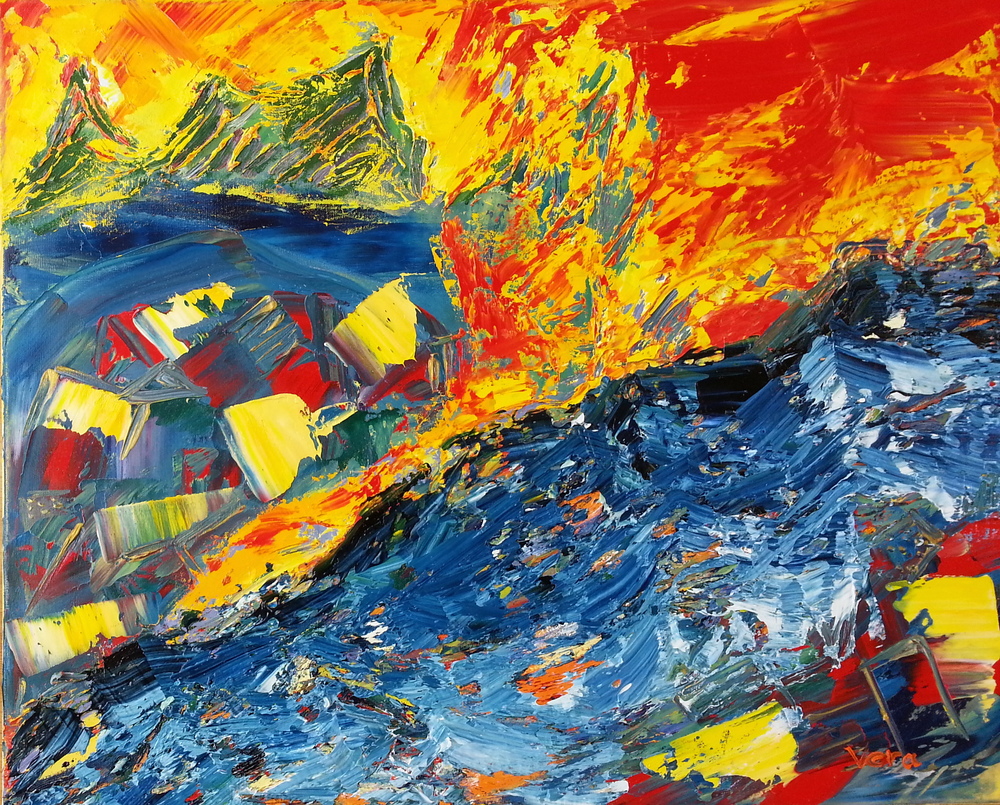
Here’s another song I’ve been trying to get out of my head (at least) since moving to Berlin in November, about “fire and ice.” It’s a reiteration of this essay (among others) in my erstwhile surveillance series for the now-dormant Rebel News. Here are the lyrics.
Now there are seven new-era Vera tunes no one but me can hear me sing (except all my friends from the Internet, as long as I can’t seeeee yoooooou)…
Of course the whole impulse can be parodied so many ways, and this one in particular strikes me suddenly as ridiculous even while it might resonate. One of my favorite singers already sung it better; and one of my favorite poets already said it better…
“Fire and Ice”
By Robert Frost
Some say the world will end in fire,
Some say in ice.
From what I’ve tasted of desire
I hold with those who favor fire.
But if it had to perish twice,
I think I know enough of hate
To say that for destruction ice
Is also great
And would suffice.

This is a new poem and painting apropos the German heart of America’s drone war that has killed thousands of innocent civilians and made children afraid of blue-skied days. Building on my ongoing attempts to update the Friedrichstrasse Banhof Kindertransport memorial “Trains to Life, Trains to Death,” and more generally to make art about the refugee crisis as it relates to the mass displacements generated in part by American foreign policy. If you want to know more about the costs of war, there’s a project on that.
Our lavender blooms velvet and honey.
The birds sing of sweetness in cool evenings
as the summer sun lingers late and long.
The same soft blue sky that holds me tight
in kisses and whispers of tomorrow and tomorrow and tomorrow—
far away makes grown men cower and children cry.
We have made our fellow man afraid of the blue sky.
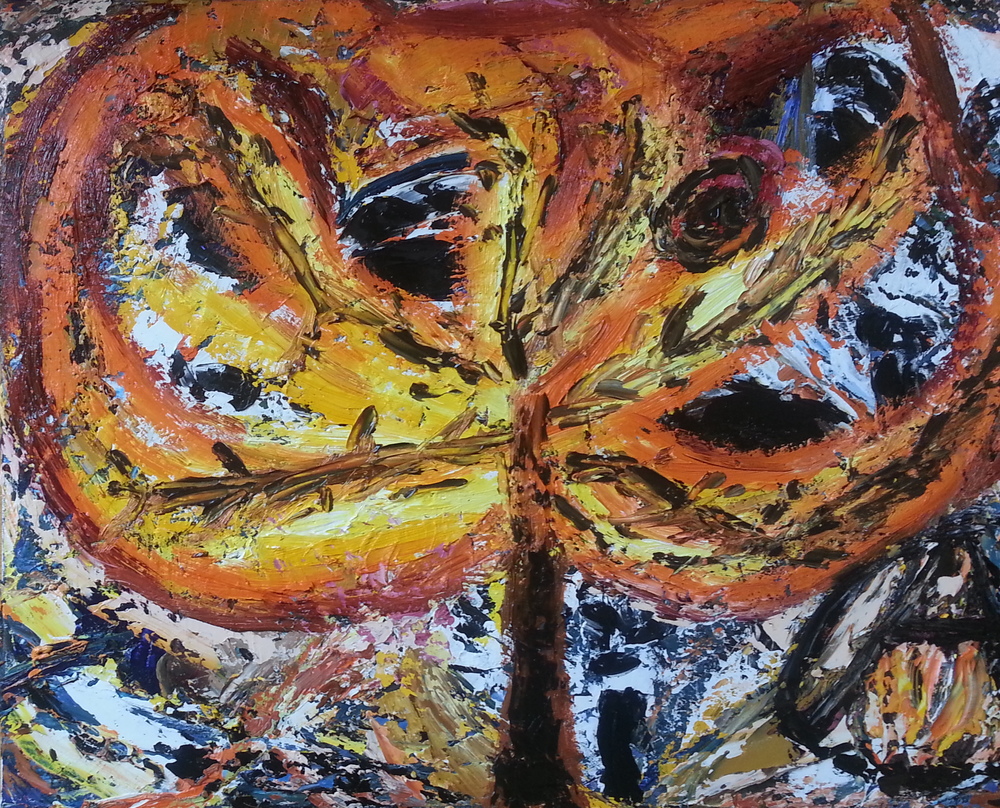
Information security is everywhere—if you know where to look. Most people don’t know they can take simple steps—like using smart phone apps Signal or WhatsApp to encrypt text messages and phone calls, or browsing the web using anonymizing free browser Tor—to reduce their vulnerability to some common forms of attack (at the low-level criminal level) and monitoring (at the state-level attacker level). But everyone knows the lyrics to that M.I.A. song about evading surveillance… Right? No? Did the U.S. Supreme Court yesterday potentially kill off the fruit of the forbidden (or poisonous) tree doctrine, weakening Constitutional and common law protections against arbitrary search, seizure, detention, and interrogation, and no one knows the playlist that addresses this problem?
Alright, then. Time for the Infosexy Playlist.
1. M.I.A.’s “Paper Planes.” How should you call me if you know corrupt intelligence and police agencies worldwide are scooping up meta-data (e.g., who calls/emails who for how long and how often) without warrants and using it to map social relationships that then feed into robot killing programs on which they won’t release civilian casualty data—and you’re either paranoid or brown and Muslim, so that freaks you out a little? You could use Signal or WhatsApp, but that provides end-to-end encryption that at best (if your endpoints are secure-ish) protects your content. Your meta-data still gets scooped up. Maybe it’s just the fact of the phone call that gets some people robot-killed. So maybe you want to “hit me on my burner pre-paid wireless.” (Can somebody also please just take Defense’s money already?)
2. “Manning: Gaga.” Take Lady Gaga’s “Telephone”—a song Chelsea Manning allegedly lip-synched to while leaking classified documents. Add WikiLeaks’ “Collateral Murder“—a video edited from footage Manning allegedly leaked showing (still unprosecuted) American war crimes in Iraq. Shake. Stir. Shake again. Stir again. Move around your cell a little more. You have time for all this and more if you’re serving the longest sentence ever served for disclosing classified information to the media by a factor of wtf.
3. Lady Gaga’s “Poker Face.” If you’re ever interrogated, it’s probably a good idea to shut up, stay calm, and remember that there’s no such thing as “lie detection” because there is no unique behavioral, physiological, or verbal lie sign to detect. Police tend to think they can do things like telling true from false confessions… But they’re really no better at it than untrained people (which is to say, wrong about half the time). They are just more sure than regular people that they’re right. So say “lawyer” or “embassy” a few dozen times (after the “respectfully, sir” part), and know that “he can’t read my poker face.”
4. “The Sound of Silence” (Simon & Garfunkel) is what your line is after that.
5. Rick Astley’s “Never Gonna Give You Up.” One of the only hit songs that has a line you can sing to interrogators, and another you can sing to your friends! To wit:
Police: Why you no confess?
Astley: “You know the rules and so do I.”
Police: Weirdo.
…
Friend: Are you gonna give me up?
Astley: “Never gonna give you up/ Never gonna let you down/ Never gonna run around and desert you/ Never gonna make you cry/ Never gonna say goodbye/ Never gonna tell a lie and hurt you.”
Friend: Freak.
6. Lianne La Havas’s “What You Don’t Do.” Maybe you don’t always take your phone with you when you go for a run or on a vacation—so that pattern of leaving it at home for a while when you’re elsewhere is normal. Maybe you don’t write down passwords on stickie notes, or ever give them to third parties—so that they are actually secure-ish. Maybe you do all those things but could stop. Sometimes, better security is what you don’t do.
7. Sting’s “Every Breath You Take.” The original creepy stalker song. But when you have to wonder if your webcam has been re-engineered as a tap or something, because we actually live in a world in which the NSA does that—you might as well sing it to the surveillance state.
8. Did you know that in some countries and U.S. States, you can actually say “My name is Trouble/ My first name’s A Mess” when stopped and asked for identity? You probably shouldn’t because widespread police use of torture has a long historical tradition in America and abroad. And it might not help you in the U.S. now anyway, since yesterday the Supreme Court ruled in Utah v. Strieff that police can use what’s traditionally called (and excluded from evidence as) “fruit of the poison tree,” or evidence from an illegal stop and search. But Strieff is specifically a case about police stopping someone on an anonymous drug tip, then ID’ing and running the dude’s name, getting an outstanding warrant, and then searching him. Without the ID, it seems they would not have had a name to run—thus no search for the warrant, and perhaps then no search. This points to one of the reasons Strieff and other cases that weaken Fourth and Fifth Amendment protections are dumb: they incentivize non-cooperation with police, at the level of refusing to give your name unless you are legally required to do so.
Keren Ann must have known this, because she put it in a song. At the everyday level, this is about asking if you’re required to do something police ask, before complying. At the infosec level, one application of not giving your name (or, per Ms. Ann, giving your name as “Trouble A. Mess”) is also not having your electronic devices on and accounts signed into when you’re crossing borders. Those are forms of electronic ID that you’re not really required to give, but protections are hazy (e.g., for foreign nationals crossing the U.S. border). So don’t show that you even have them, or you may be asked by border guards to search your own email so they can read it. Then, like police in Strieff, they can use the results (e.g., if you’ve been looking for work without the right visa) against you. This has actually been the reality for non-U.S. citizens for, well, all of U.S. history.
9. Sometimes I think I should have always kept my damn fool mouth shut about all th
e things, instead of spouting off when I must and ending up penniless in Mexico City with a bad haircut (for example). But actually, I don’t regret standing on the side of people who at least try to “Yell Fire,” as Michael Franti says. Sometimes you figure out what you’re trying to say by trying and failing (and trying and failing, and trying and failing) to say it. That’s not an infosec thing so much as a free speech thing… Unless you don’t want to learn this the hard way, and just blog pseudonymously from the beginning. The downside of hiding properly is that you might not meet a bunch of cool people who get it. The upside is that you will probably be a lot safer.
10. But what do you do when yelling fire doesn’t work? When your voice can’t affect change in the declining firm, organization, or state to which your loyalty is presumed? According to A.O. Hirschman, your alternative course of action is exit. In (Nancy Sinatra’s) other words, “These Boots Were Made for Walking.” That can mean getting your data off American servers in infosec terms, since a European high court ruled in October that, in effect, American law and intelligence agencies’ cozy relationships with big data-holding companies like Google, Facebook, and Amazon was violating Europeans’ human right to privacy, reminding them of Stasi surveillance on steroids—so the Safe Harbor treaty governing storage of that data was off. (See also the third point in this essay.)
Or you could read that exit option in a broader way. Just as no device is absolutely secure, no place is absolutely safe. But chocolate in Europe is better.
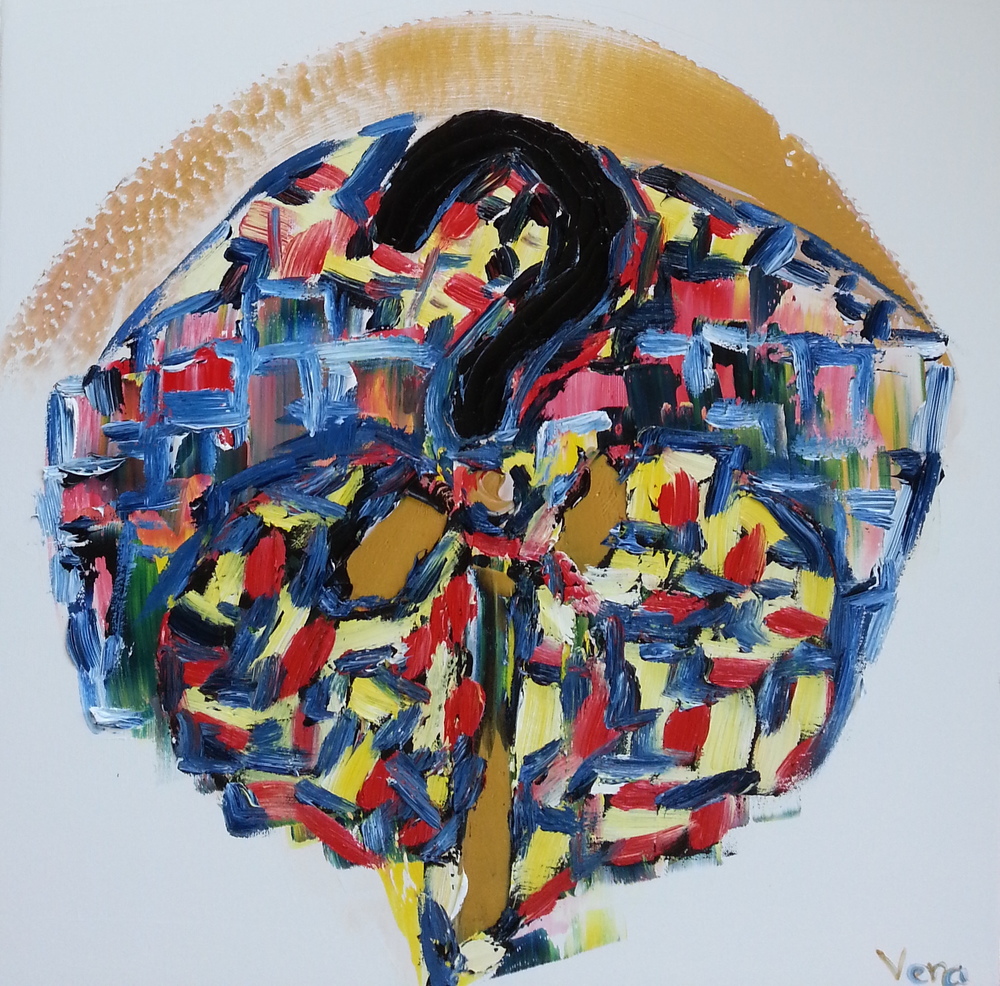
Finished another few layers on this painting I made to raise awareness and funds for Lauri Love, a U.K. hacker who did good work as an Occupy activist, won a big privacy victory (against a forced decryption attempt—i.e., let us search your encrypted device even though we’re not pursuing an ongoing investigation—we just want to look because we can) last month, and is fighting U.S. extradition with the help of the Courage Foundation for allegedly participating in Anonymous’s #OpLastResort in peaceful protest of the Obama Administration’s overzealous prosecution (combined with academic institutional spinelessness) that resulted in Aaron Swartz’s death.
It’s not done yet… Sometimes they’re never done.
But if you like it, or another painting you’ve seen here, you can enter my ongoing raffle to win a painting by donating directly to Lauri’s Courage Defense Fund by 28 June and emailing me the receipt (vera at verawil dot de). One euro = one chance to win. So the more you support Lauri the likelier it is you get pretty art.
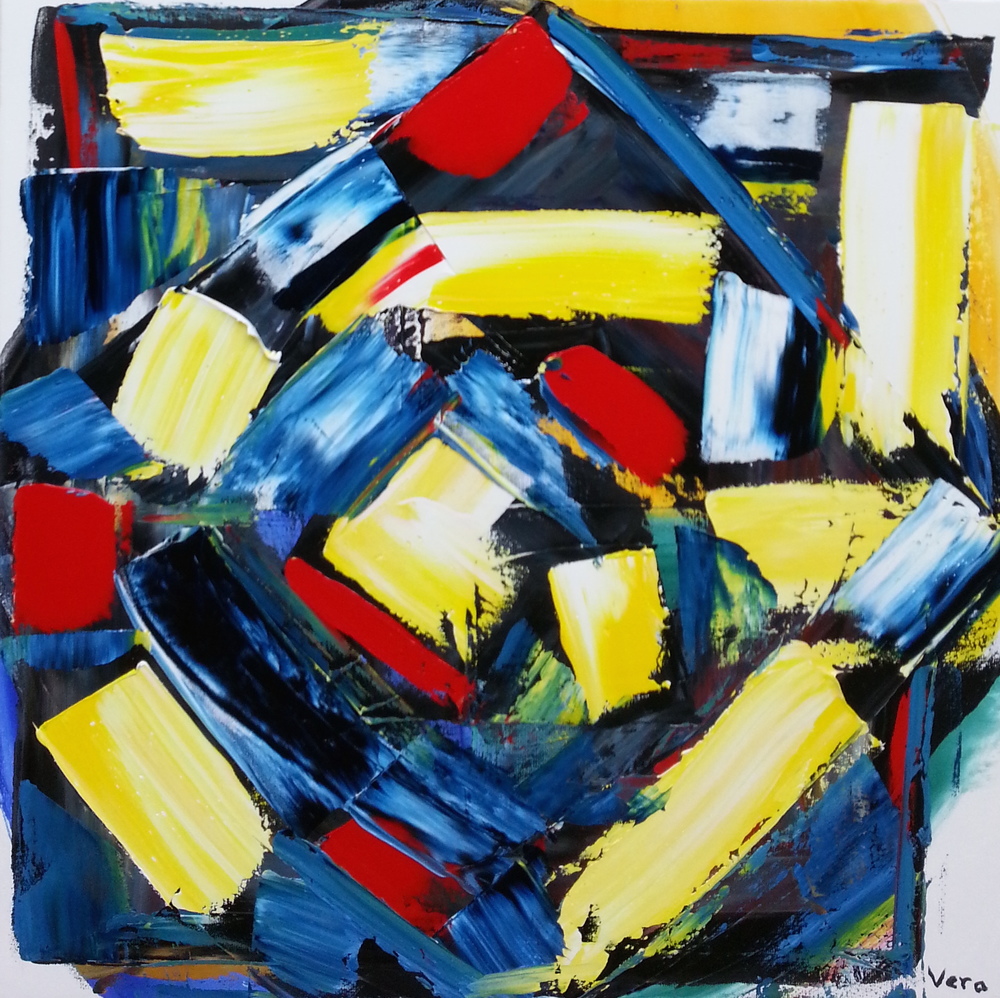
This is another of local Wildelife expert Mr. Wolf’s winter-vintage love songs. That makes six songs in this new period that have made it all the way out of my head in whole (draft of a vocal track of a) song form!
So I had wanted to have a dozen written and recorded at a professional level I can only aspire to—in November.
So there are so many more snippets, and so many more steps to make them all more whole…
And I guess music is not my thing since I’m always dying to paint. I have to make money for all sorts of practical reasons (like showing my new country I’m a big girl so they let me stay). And my paintings have always sold, but songs not so much—so that’s probably the way to go. Plus it’s just so hard to make noise sometimes.
Still, I’m usually so happy when I have something recorded… Even if it’s literally the only time I can bring myself to sing. And then only when I’m sure no one can hear me—despite the fact I fully intend to put it online later if it’s halfway decent!
So funny, living for art when you don’t know what that means or how public you should be about the messy facts of doing it, including not knowing when you have done it, or done a draft of it, or… I’ll never forget the time I saw a stranger dragging one of my paintings away from the dumpster. It was over ten years ago. It must have been in Alabama. I had tried and, in my mind, totally failed to update “Guernica.” (No, I never aim high.) I was just taking out more trash when this random dude hauling my botched painting away from the dumpster stopped me. He was so excited, he had to tell me about the treasure he had found; if he was putting me on, that is, if he had any idea I was the artist, he was very convincing. “Can you imagine throwing something like that away?”
Barrel bombs, flames; mountains over plains; a sword, a wound, a boat on waves; a sparrow holding a jasmine flower… And a few links to organizations that support peaceful civil society resistance in Syria—Adopt A Revolution (connecting activists) and 15th Garden (connecting farmers with seeds to grow food in besieged cities).
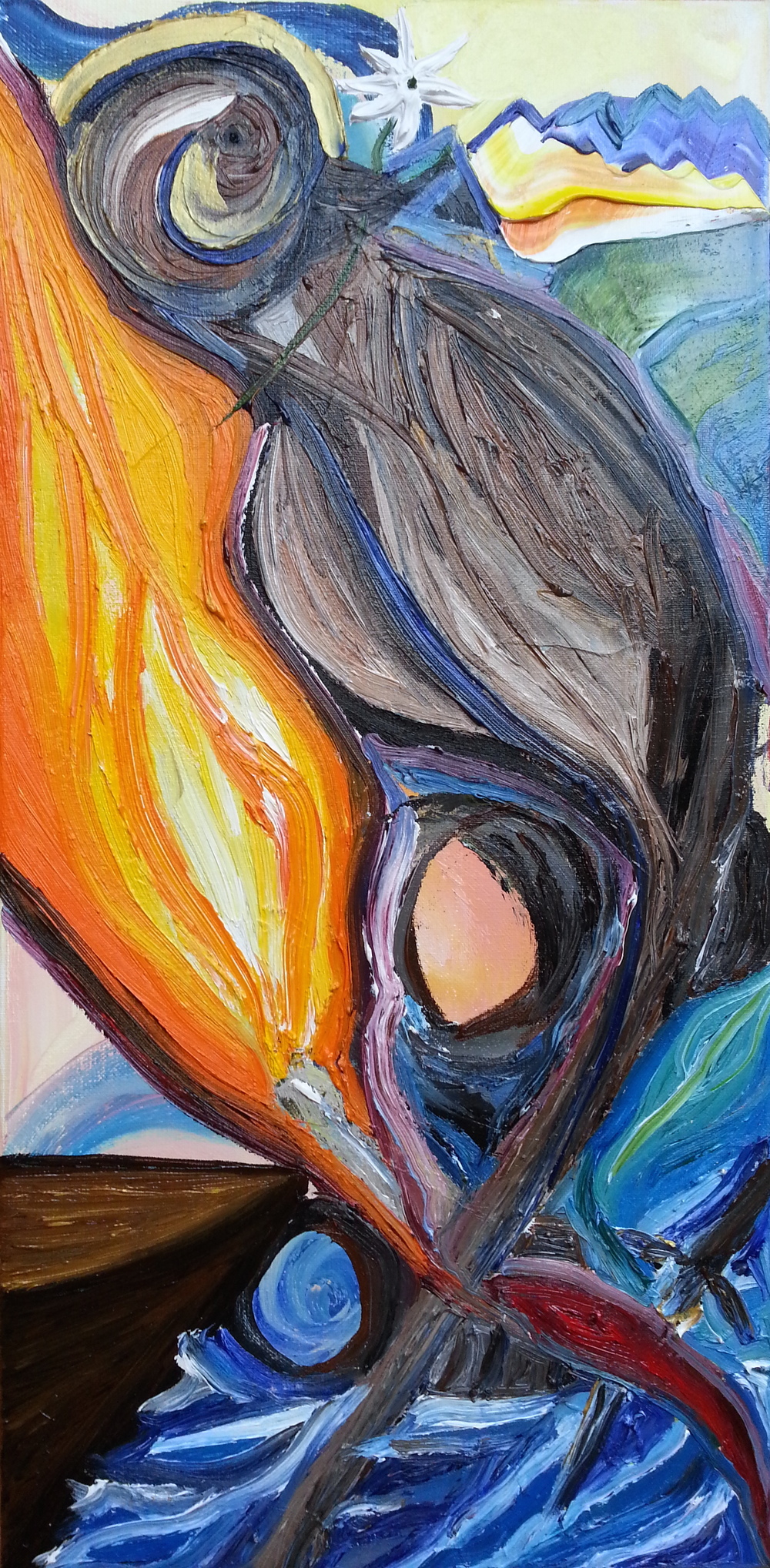
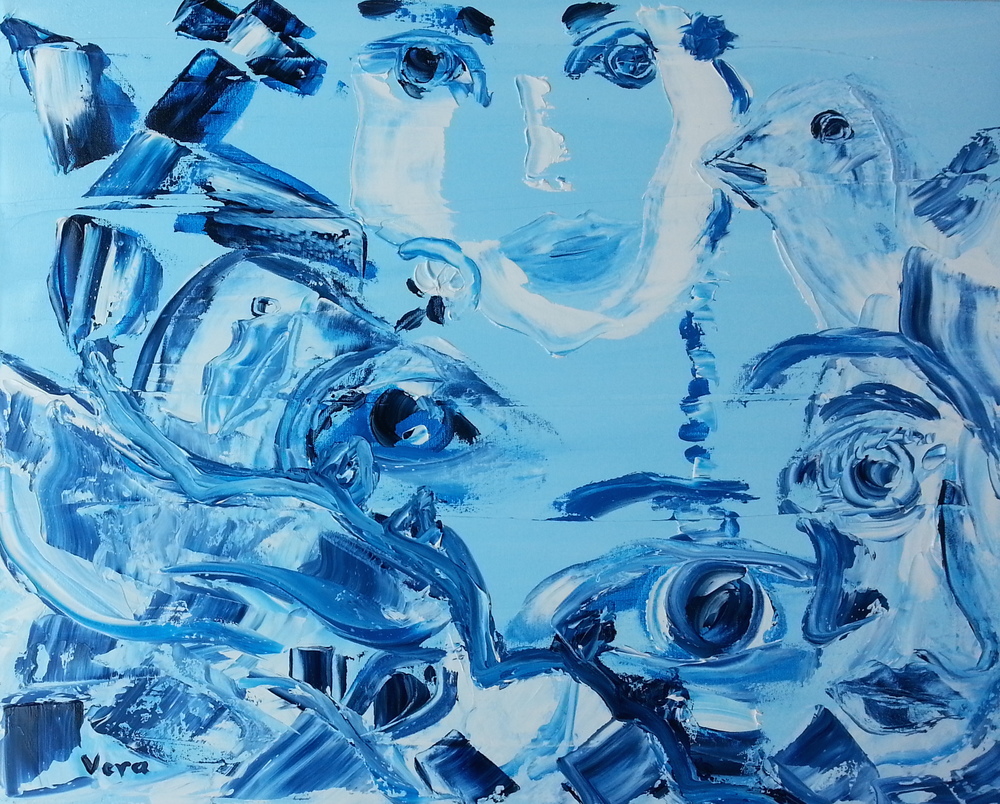
This is one of the love songs for local Wildelife expert Mr. Wolf that dropped out of thin air this winter, and that (like all my songs) I have been mostly too embarrassed to sing even when no one can hear me.
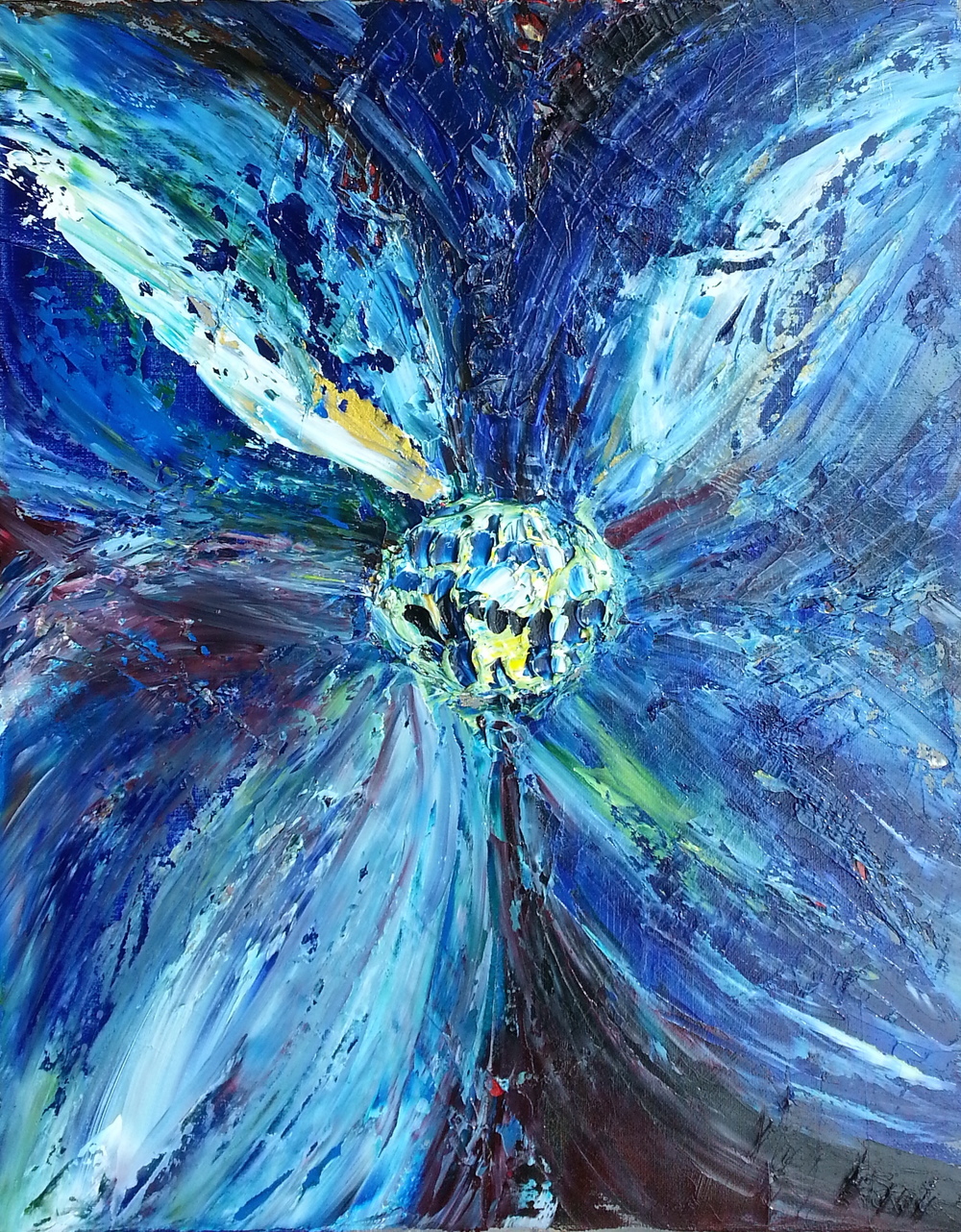
“North Star Flower”
for Fernsehturm—Far-seeing (TV) Tower, Berlin
Blossom of light at night,
true North shining bright.
Every German city has one,
far-seeing, cloud-sprung.
This one reflects the setting sun
accidentally as a cross—
the revenge of the church, across
the old dividing wall of faith.
One empire fell to another,
sent its wraith.
What relics will we leave the next?
What accidental mooring for the perplexed—
to be dug out of sand or stone,
or stumbled across in the ocean alone?
How shall we say across spaces and times
that we knew, as we lived it, how history rhymes?
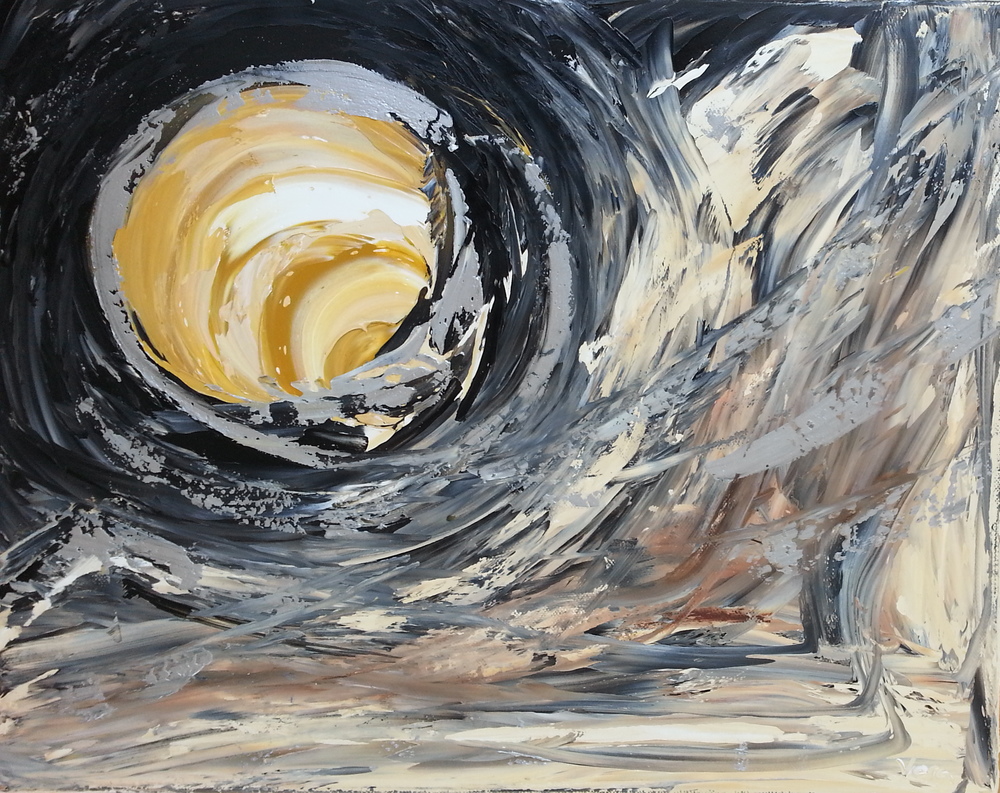
This is a (draft of a) song I wrote in my guest room in Osaka after presenting at the American Studies Symposium in March. I was up all night afterwards worrying (even though it went well)—and talking with some friends who were up on the other side of the world, worrying themselves about their own worries too.
I’ve been meaning to record just the vocal track draft for these three months, not to mention putting proper accompaniment with it and such. But I’m still too embarrassed to sing when no one can hear me most days. (Cf poetry –> music –> performance creative process struggle.) Sometimes I think about setting up a better space for music in my studio… Since I seem to dream or daydream songs and song snippets all the time, and then not do the two dozen next-steps to make them songs that live and breathe outside my head… And that would be easier if it didn’t mean quality time with built-in computer mic, online keyboard, and online metronome (which are good and nice to have, but not the real thing). But, I’m not sure it’s an equipment deficit, rather than just not being my forte (a thing that’s easy enough to complete in the way that I can make paintings exist in a really fluid and natural way). Maybe song snippets are like painting ideas (that I have so many more lists of than I could ever possibly execute), or poem/essay/article/etc. ideas (that used to go in a filing cabinet or desk drawer, and now get hidden in a notebook to be mostly forgotten, if they’re lucky).
There’s brain pollen. [ACHOO!] And then there’s the stuff you actually do.
Music is like that constantly wafting brain pollen for me now. It was a huge part of my life a few decades ago. So big it interfered with school. It didn’t seem to offer the quick way out of Alabama I was looking for (and found in academia). Especially since my training was classical and my proclivities alt-pop-ish. So I quit. I’ve often thought that was a bad move, since it turned out I was an artist after all.
Now I think I’m learning to accept that I’m just a living-room singer at best; I have sometimes a strong sense of voice, but more in a visual way, somehow. Although part of being an artist to me is also that it’s messy—the thing you show up to, live for, relax into, claim value for… The boundaries of the field are unclear, sometimes nonexistent. There is no track to be on or off. That’s part of the challenge. Stand-up can be important to me as a painter even as it seems on the surface like a distraction. It will make sense later, or not. Music can be harder than anything even though it’s the only artform I have actual training in. Sometimes training is a burden rather than a boon. Makes it easier to get in your own way. Which I guess is what this song (draft) is all about.
Meditating on a favorite quote (below) and an old Dutch saying: Hij heeft de klok wel horen luiden maar weet niet waar de klepel hangt. He has heard the bell, but he doesn’t know where the clapper is… (Meaning that someone thinks he gets it, but doesn’t.)
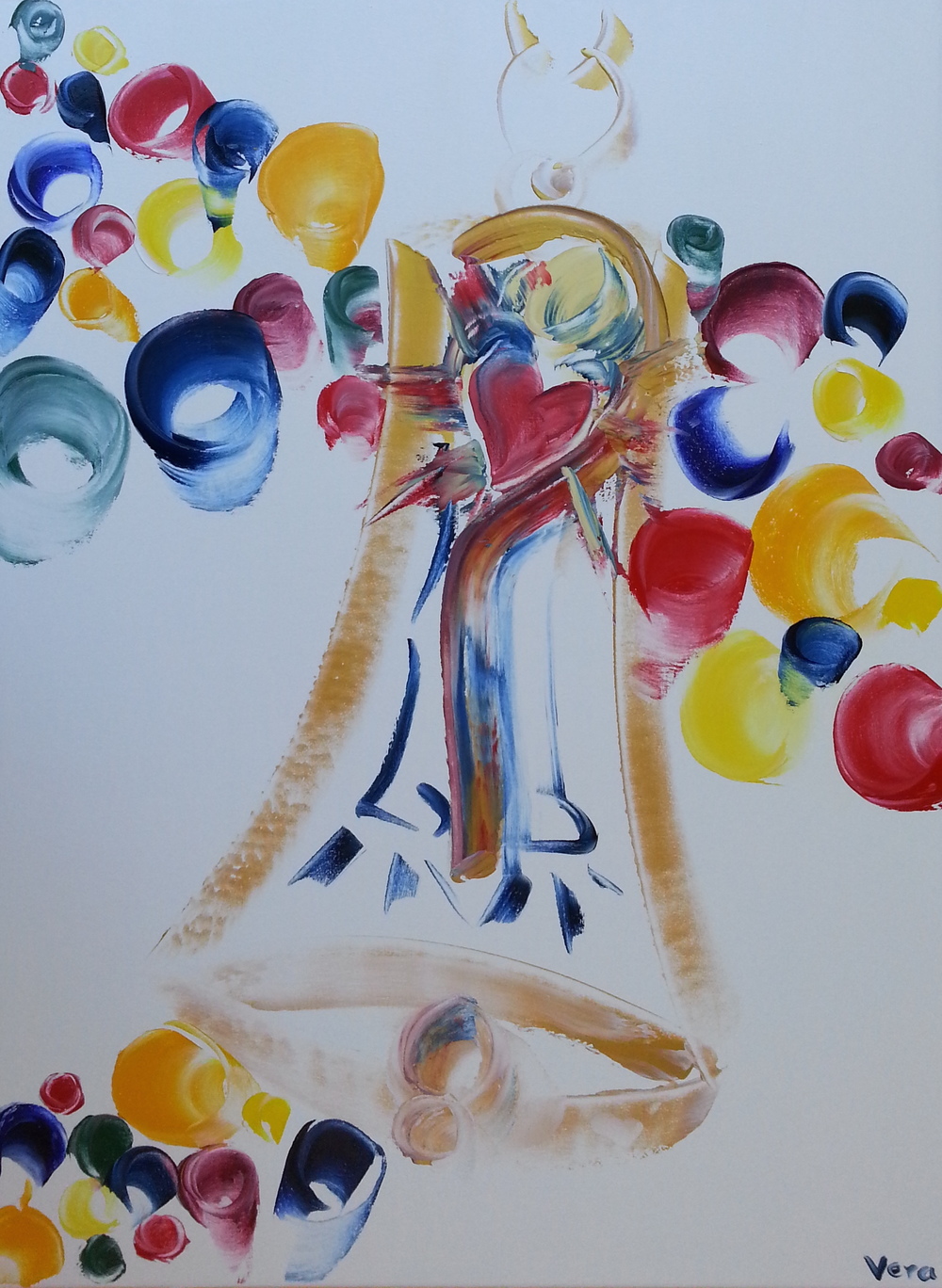
“Creativity always comes a surprise to us; therefore we can never count on it and we dare not believe in it until it has happened. In other words, we would not consciously engage upon tasks whose success clearly requires that creativity be forthcoming. Hence, the only way in which we can bring our creative resources fully into play is by misjudging the nature of the task, by presenting it to ourselves as more routine, simple, undemanding of genuine creativity that it will turn out to be”
― Albert O. Hirschman, author of Exit, Voice, and Loyalty: Responses to Decline in Firms, Organizations, and States
The Dutch proverb is about comprehension being hard and hard to check internally. The “he” in the saying knows that he hears the bell—but needs someone else to tell him he doesn’t know where the clapper is. Haring’s work on the politics of technology is often about pushing people to see new ways in which technology is a stimulus that affects us as social organisms like any other modality of power. In Haring, the clapper is power and technology is the sound of the bell—shaping our internal worlds, communication patterns, and politics before we can even localize the felt phenomena. Kahan and others talk about how appeals to motivated political reasoning seem to work in much the same way in cognition; we hear the bell of emotion generating opinion before we can articulate the logic of why that bell, where, how. Hirschman’s creativity, in turn, is about not scaring off that openness to understanding things anew that lets us figure out where the clapper’s at.
In other words, you people don’t actually have any idea what the fuck I’m trying to say.
For Moem (if she likes it), to whom I have long owed a tiger. Inspired by one of my favorite lines in one of my favorite poems…
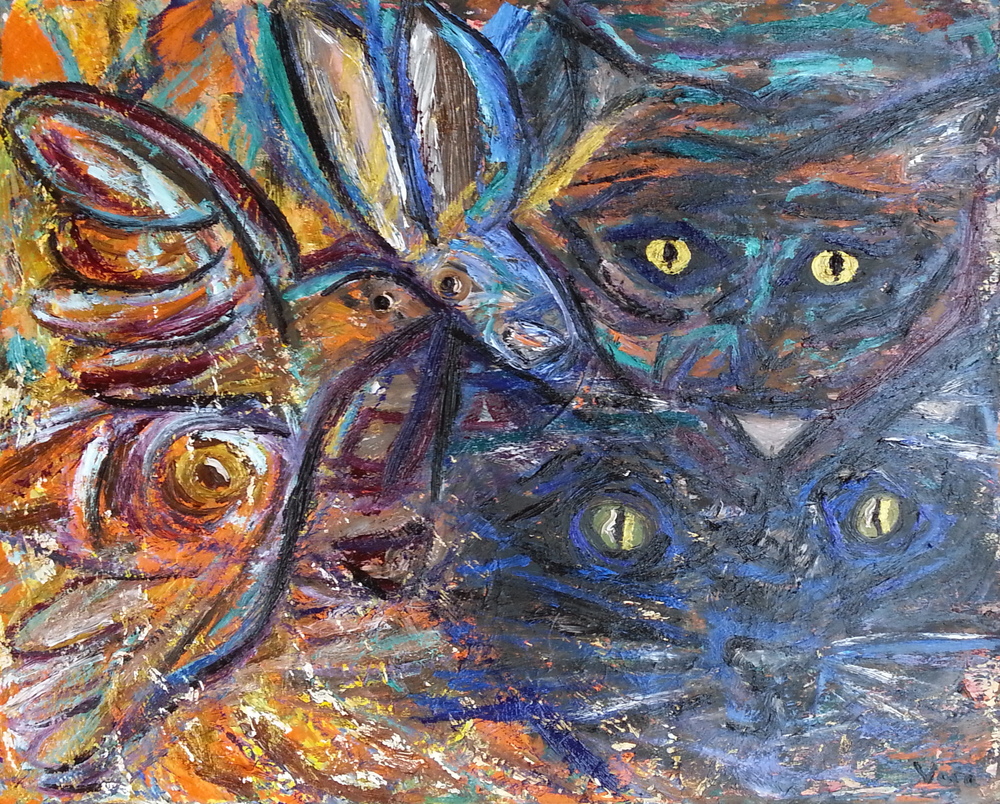
“Wild Geese”
By Mary Oliver
You do not have to be good.
You do not have to walk on your knees
For a hundred miles through the desert, repenting.
You only have to let the soft animal of your body
love what it loves.
Tell me about your despair, yours, and I will tell you mine.
Meanwhile the world goes on.
Meanwhile the sun and the clear pebbles of the rain
are moving across the landscapes,
over the prairies and the deep trees,
the mountains and the rivers.
Meanwhile the wild geese, high in the clean blue air,
are heading home again.
Whoever you are, no matter how lonely,
the world offers itself to your imagination,
calls to you like the wild geese, harsh and exciting —
over and over announcing your place
in the family of things.
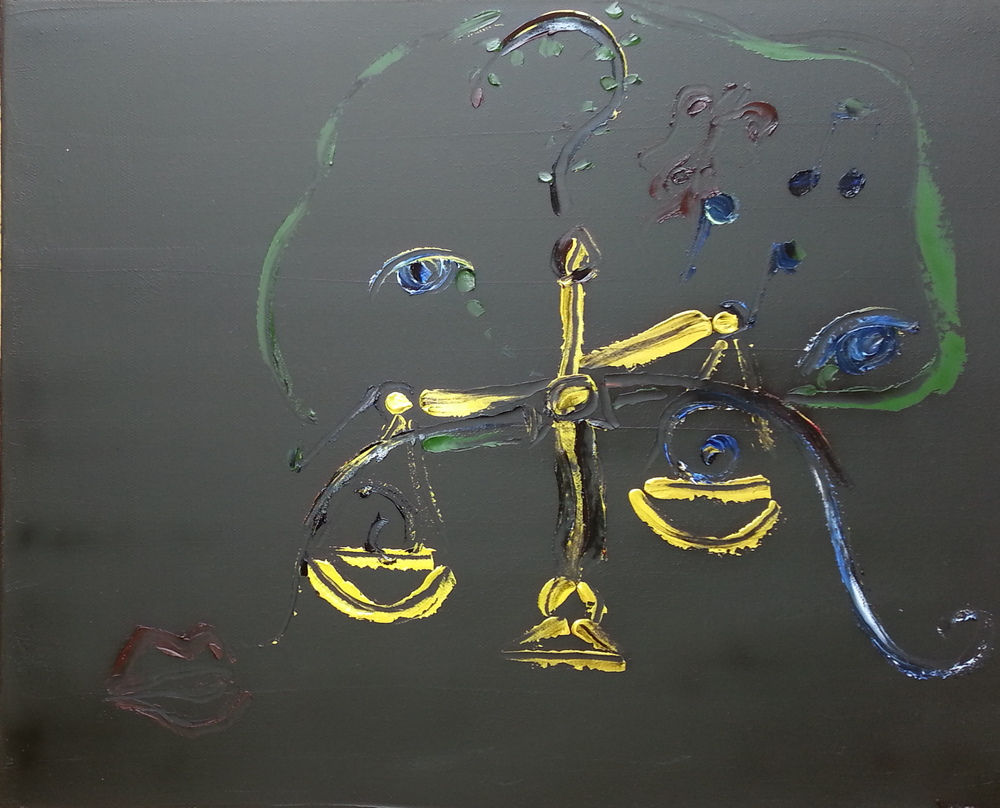
This painting commemorates the upcoming 13 June, 2016, 50th anniversary of the U.S. Supreme Court’s landmark Fifth Amendment ruling in Miranda v. Arizona (1966). I’ve written previously about Miranda (in poetry, bloggery, and my Ph.D. dissertation). I’m still running a painting raffle to support Lauri Love—whose recent UK win against forced decryption furthers the right to silence.
Dish. Your Miranda right—from a U.S. Constitutional law precedent establishing the right to remain silent and refrain from self-incrimination—is dead, along with your Fourth Amendment right against unlawful search and seizure. Formalized torture, due process-free assassination, and mass surveillance programs killed them years ago—if they were ever anything but aspirational to begin with. (And yes, Virginia, that goes for American citizens on American soil, too.)
If it makes you feel any better, a cynical person might argue it was a crummy right anyway. Miranda rights come from the judicial collision of a rapist (Miranda) getting off while an imaginary friend (God) scared the ruling class into torturing less—but only because extracting confessions was His turf.
Miranda was convicted of rape—twice. After the first trial, he got his conviction overturned on appeal. Police hadn’t advised him that he could remain silent. So the high court tossed Miranda’s confession. A new jury convicted him of rape again. (It was a good case. He left the ropes dangling in his car.)
The right to remain silent that Miranda got reasserted in his infamous appeal stems from American and British legal backlash against torture in the context of the Brits’ Star Chamber. Even the Star Chamber didn’t have the authority to order torture in cases where the death penalty was on the table. The current U.S. regime goes farther.
The argument against torture at the time of the Star Chamber was that the state cannot force you to confess, because you only owe your confessions to God. Godless Western societies no longer have that bright-line rationale for why torture is unacceptable. Of course, it’s against domestic and international law on paper. But in practice, the U.S. systematically fails to hold accountable law enforcement who torture Americans— and has formally threatened to invade any international criminal court that tries to call that bluff on U.S. officials, intelligence agents, or military servicepersons. (Some countries are trying it anyway, but only on small potatoes, so far.)
So to summarize, your current U.S. Constitutional right to silence looks something like—
Rapist + Imaginary friend – National security (terror zomgs so scary liquids SO SCARY no one knows what base rates are hahaha let’s fund fraudulent and abusive programs some more and fuck actual causes of death ZOMGS SHE SAID TERROR GETDOWNONTHEGROUND!!!elebenty) = Miranda rights.
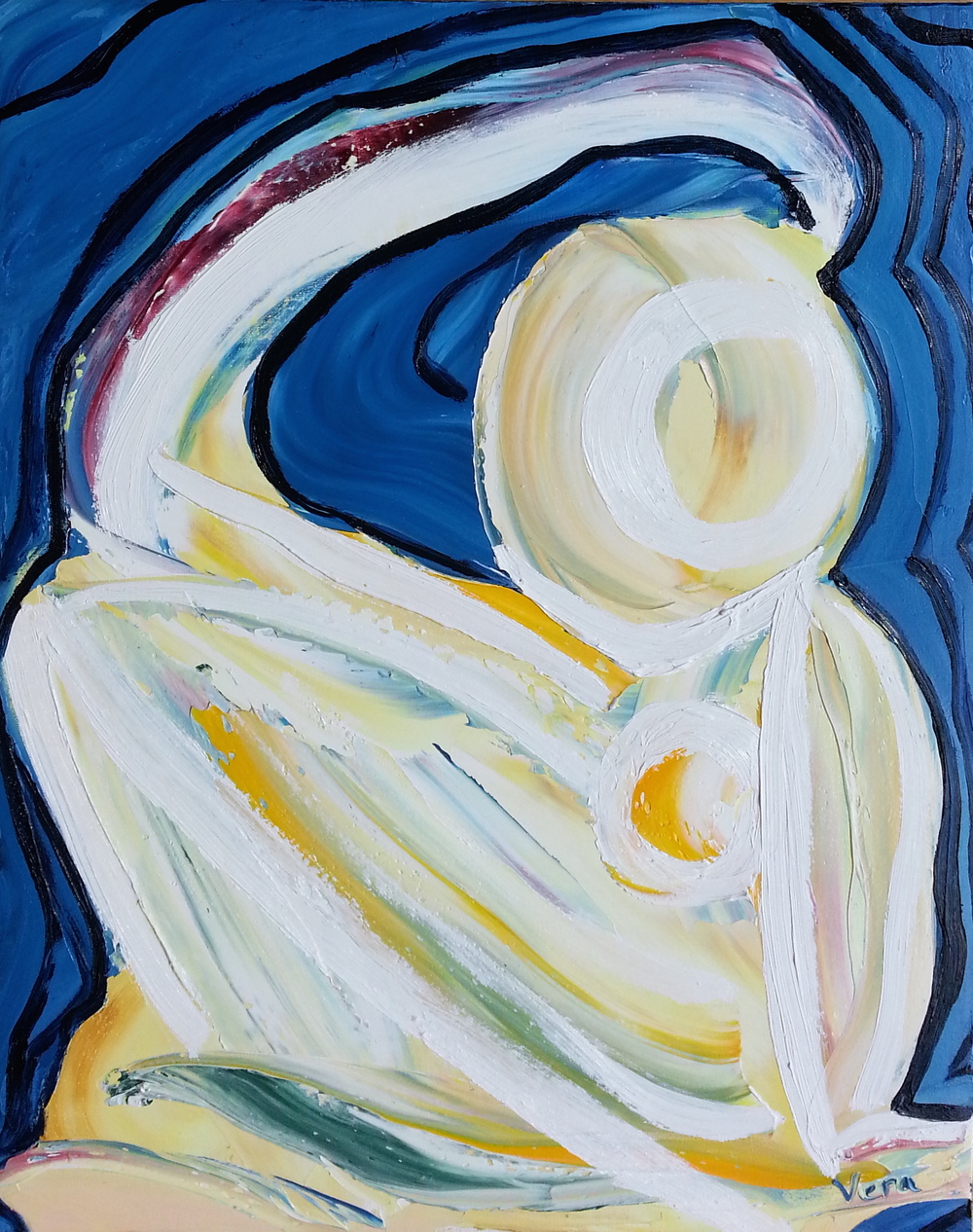
Here are a new painting and poem apropos the anniversary Saturday of China’s brutal suppression of peaceful democratic expression in Tiananmen Square on 4 June 1989—which is also my one-year anniversary of leaving the U.S.…
I left on the anniversary of Tiananmen Square.
Now you can’t read this in China.
That place and date crouch,
hidden in the shadows of memory
and its faceless censors,
unsalaried and ashamed.
My dictatorship is better than yours—
so those who stay
like to say.
It’s a pretention
that draws attention
to false choices
like Tony the Tiger or Toucan,
Neither wall nor waterboarding—or Yes, We Can.
The world is wider and narrower than that.
It is like a net thrown up against the night sky,
full of darkness and holding nothing but light.
Or a crane moving heavily across the blue,
not knowing where water begins and air ends,
but only sensing how the edge grows nearer,
although it was made for this flight.
How the change grows nearer,
although it chooses without choosing this fight.
As my Facebook feed fills up with UCLA friends saying they’re ok during the active shooter lock-down, I put down the palette knife and stroll to a late dinner in the Northern European summer sunshine. Checking my phone for news after ordering, I look at bloody pictures from Iraq that CNN has paired with a headline about the U.S. State Department Tuesday issuing a travel warning for the entire European continent despite no new, specific intelligence. A line of American tourists bikes past the café—unmistakably fat, helmet-clad, handle bar-gripping on rented bikes.
I yawn and read another headline, this one on American death rates rising for the first time in decades—from increased drug overdoses, suicides, Alzheimer’s disease, and heart disease. Dinner is tasty and I’m happy, I think to myself; but I should bike more. I come home and illustrate this poem listening to Ani DiFranco’s “Little Plastic Castle” (“on a day which is every day/ i picked up a magazine/ which is every magazine. read a story, and then forgot it right away/ they say goldfish have no memory/ i guess their lives are much like mine/ and the little plastic castle/ is a surprise every time”)…
… Or attempt to, I think to myself sardonically after failing to optimally execute my sketch of a McDonald’s M qua flames behind a bicycle with Mutually Assured Destruction lit bomb-wheels on a rainbow climate change graph symbolizing the attention game of transgender bathroom bullshit politics. Insert your favorite source here on actual base rates of global violent criminal victimization, illness, and/or death.
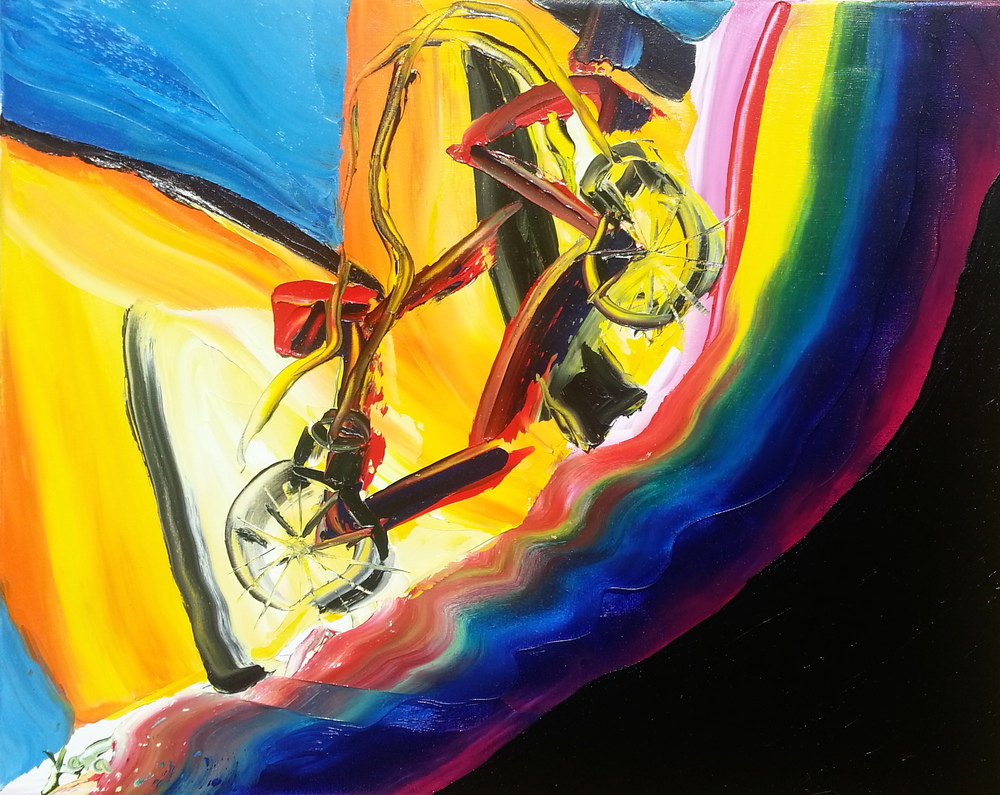
“The Road to Death”
The road to death is paved with living,
so say the men who sell us bombs.
Disarming would not be forgiving;
waging peace, the greatest of wrongs.
Our destruction is mutually assured.
That’s why we must make war on war,
fight fire with fire and ice with ice.
They say the world will end—if we play nice.
Meanwhile, temperatures rise more and more.
Ecosystems crumble, unsecured.
It seems a slower-crashing train is different
from the Big Bang after all.
Either that, or theories are indifferent
dressing on the meaty, spinning ball.
Or, to nightmares of apocalypse we are inured.
Perhaps there is still another road,
a road to life not paved with death,
where the race to arms and oil is slowed.
Perhaps not. It might be for the best.
We’ve not left many roads for the rest.
With deference to Carol Cohn, “Sex and Death in the Rational World of Defense Intellectuals.”
Apropos “European migrant crisis: Shipwrecks ‘kill up to 700 migrants’ “— a 29 May 2016 BBC headline rhyming with others across the years and media outlets that have the interesting misfortune to cover this first wave of mass displacements in the era of climate change and the global resource endgame that is its cause and effect.
… Here are a new painting (in a series) and poem building on my earlier brainstorming re. how to update the Kindertransport memorial in Berlin.
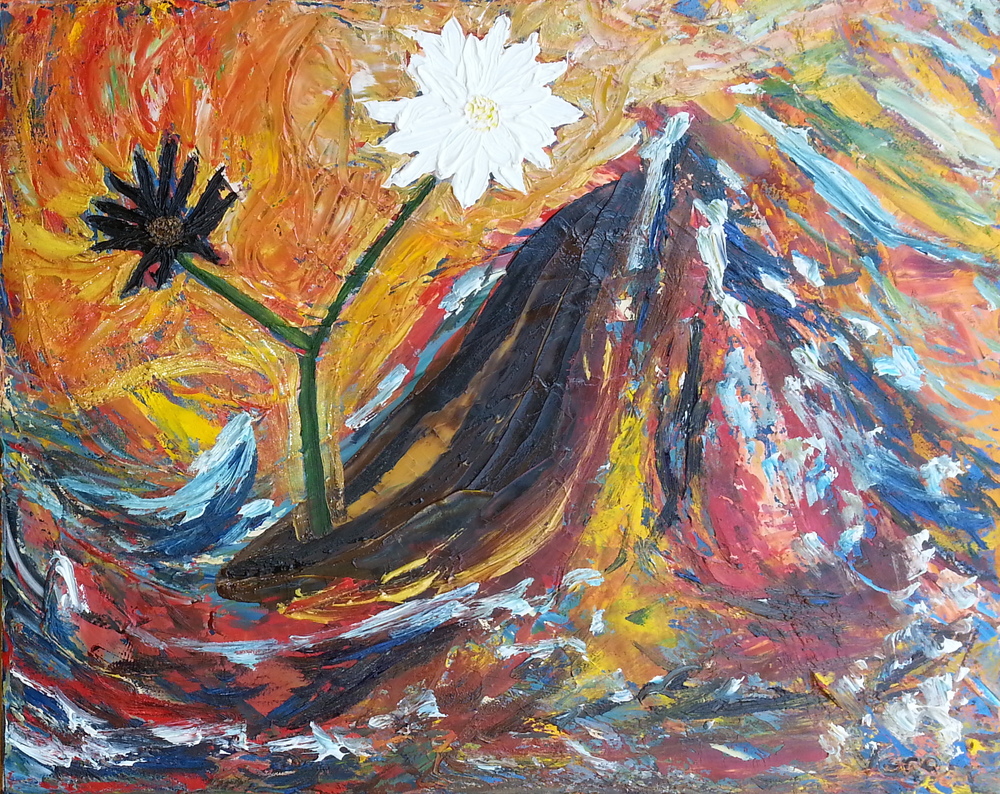
I want to give the living children flowers.
The dead have stone and petals enough.
I want to give the living children homes.
Not mine; they deserve their own.
I want to give the living children peace.
A living planet. A place of safety. Quiet sleep.
History grinds and rhymes.
At Friedrichstrasse Banhof, I leave flowers.
At the visa office, they tell me:
“This is not how things would’ve gone in your country.”
I want to say: That’s why I’m here.
I got on a plane with a backpack
like our grandparents got on boats
with suitcases and pregnant wives.
But I only nod and think of you.
You are on a boat to life.
You are on a boat to death.
Somewhere, years and storms hence,
you will be telling your grandchildren
how you braved the waters and the hate.
They will be so grateful for your escape.
They will wonder how you carried on.
You will build ships stronger than souls.
You will sing the song that carries us home.